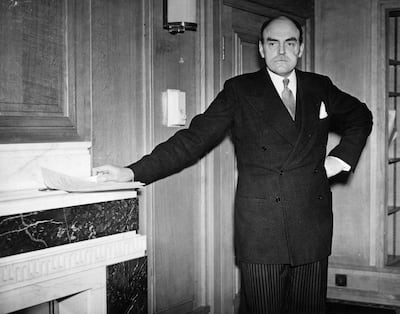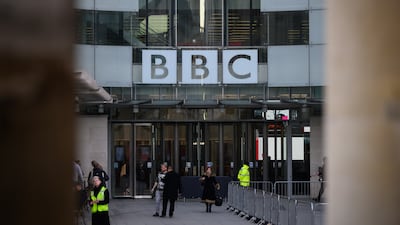The BBC hasn't always been popular. In its infancy it was considered remote and aloof, like Lord Reith its creator. The Second World War changed that.
The BBC became a unifying voice, trusted and adored by Britons in fear of invasion and bombing. That popularity extended into Nazi occupied Europe. Here the BBC offered truth, a great disinfectant. Its reputation made it an excellent tool of British soft power. Here was an institution that projected British ideals of liberty, democracy and justice. Government liked it.
And, because the see-saw of British politics means oppositions expect to become governments, both major British political parties liked it too. Labour and Conservative Prime Ministers criticised the national broadcaster, but they did not harm it. For decades they renewed its Royal Charter and agreed to increases in the licence fee that allowed the BBC to add new radio and TV channels and later websites. Inside BBC News, journalists learnt that “as long as we are criticised by both sides, we must be doing something right”. Reporting for the BBC was an honour.
When Margaret Thatcher came to power in 1979, some in the BBC trembled. The Iron Lady's husband was no friend. Denis Thatcher believed the BBC was a “nest of pinkoes”, hostile to private enterprise and Conservative values. But Margaret Thatcher did the BBC no serious harm. None of her Conservative successors bowed to pressure from party loyalists who, as the 21st century began, increasingly viewed the corporation as a cultural enemy.
Brexit changed that. Too many in the BBC assumed Britain would vote to remain in the EU. The corporation's reporting of the referendum campaign was laden with assumptions that leaving would be a colossal mistake. Conservative Brexiteers had always disliked Auntie Beeb, now they hated her.
When Boris Johnson became Prime Minister, Downing Street ordered ministers not to appear on BBC radio's flagship Today programme. Senior Conservatives complained that the BBC only spoke to “a pro remain metropolitan bubble in Islington”. A BBC editor accused the Government of “putting a foot on the BBC's windpipe”. It was, perhaps, testament to the power of tradition that two years elapsed before Mr Johnson's government struck back.
On Sunday, Nadine Dorries, Secretary of State for Media, tweeted her plan to abolish the licence fee, the universal flat rate payment that has kept the BBC better funded than any of its domestic rivals. The following day Mrs Dorries appeared in the House of Commons to confirm that the £159 charge would not rise with inflation in the next two years. That breached a previous agreement between ministers and the BBC. And worse news followed. Mrs Dorries promised that when the BBC's charter expires in 2027, the licence fee will not be renewed. Conservatives are determined to find a better way to fund a smaller BBC.
The licence fee currently gives the corporation £3.7 billion per year to make TV, radio, the BBC website, podcasts, the iPlayer and apps. Payable by every television owner, except the poorest British pensioners, it is charged at a flat rate irrespective of income. Simply accepted for decades, it has recently become the target of furious criticism by millions of Britons who now get entertainment from streaming services and their news from commercial broadcasters or newspapers. Unfortunately, it is hard to replace.
Mrs Dorries insists she does not want to kill the BBC, simply to reshape it to compete in a changing media market. But how? A purely commercial solution is unlikely. The BBC's rivals do not want to compete with it for advertising revenue. Subscription funding is technically impossible without expensive changes to Britain's transmission system. And subscription would reduce the range of BBC output. It would not pay for World Service radio and other services that the Foreign Office and Ministry of Defence consider powerful tools of influence.
One senior Conservative, John Whittingdale, a former media minister, has suggested direct state funding. But funding by the British public means the BBC is owned by the people. Funding by the state would make it a state broadcaster. The reputational consequences would undermine its diplomatic value. Some of the BBC's friends suggest a universal levy on broadband connections. This would certainly raise money, but it might soon become as unpopular as the licence fee.
Of course, Boris Johnson and Nadine Dorries may not be in office in 2027. The former may not be in power next week. So, this government may never have to deal a decisive blow against a national institution that rivals the National Health Service as a symbol of British exceptionalism. Mr Johnson's government has issued an unprecedented threat against the BBC. Delivering on its menaces will be immeasurably harder.
COMPANY%20PROFILE
%3Cp%3E%3Cstrong%3ECompany%20name%3A%3C%2Fstrong%3E%20Revibe%20%0D%3Cbr%3E%3Cstrong%3EStarted%3A%3C%2Fstrong%3E%202022%0D%3Cbr%3E%3Cstrong%3EFounders%3A%3C%2Fstrong%3E%20Hamza%20Iraqui%20and%20Abdessamad%20Ben%20Zakour%20%0D%3Cbr%3E%3Cstrong%3EBased%3A%3C%2Fstrong%3E%20UAE%20%0D%3Cbr%3E%3Cstrong%3EIndustry%3A%3C%2Fstrong%3E%20Refurbished%20electronics%20%0D%3Cbr%3E%3Cstrong%3EFunds%20raised%20so%20far%3A%3C%2Fstrong%3E%20%2410m%20%0D%3Cbr%3E%3Cstrong%3EInvestors%3A%20%3C%2Fstrong%3EFlat6Labs%2C%20Resonance%20and%20various%20others%0D%3C%2Fp%3E%0A
Jetour T1 specs
Engine: 2-litre turbocharged
Power: 254hp
Torque: 390Nm
Price: From Dh126,000
Available: Now
if you go
Reading List
Practitioners of mindful eating recommend the following books to get you started:
Savor: Mindful Eating, Mindful Life by Thich Nhat Hanh and Dr Lilian Cheung
How to Eat by Thich Nhat Hanh
The Mindful Diet by Dr Ruth Wolever
Mindful Eating by Dr Jan Bays
How to Raise a Mindful Eaterby Maryann Jacobsen
Company profile
Company: Rent Your Wardrobe
Date started: May 2021
Founder: Mamta Arora
Based: Dubai
Sector: Clothes rental subscription
Stage: Bootstrapped, self-funded
The rules on fostering in the UAE
A foster couple or family must:
- be Muslim, Emirati and be residing in the UAE
- not be younger than 25 years old
- not have been convicted of offences or crimes involving moral turpitude
- be free of infectious diseases or psychological and mental disorders
- have the ability to support its members and the foster child financially
- undertake to treat and raise the child in a proper manner and take care of his or her health and well-being
- A single, divorced or widowed Muslim Emirati female, residing in the UAE may apply to foster a child if she is at least 30 years old and able to support the child financially
UAE currency: the story behind the money in your pockets
England squads for Test and T20 series against New Zealand
Test squad: Joe Root (capt), Jofra Archer, Stuart Broad, Rory Burns, Jos Buttler, Zak Crawley, Sam Curran, Joe Denly, Jack Leach, Saqib Mahmood, Matthew Parkinson, Ollie Pope, Dominic Sibley, Ben Stokes, Chris Woakes
T20 squad: Eoin Morgan (capt), Jonny Bairstow, Tom Banton, Sam Billings, Pat Brown, Sam Curran, Tom Curran, Joe Denly, Lewis Gregory, Chris Jordan, Saqib Mahmood, Dawid Malan, Matt Parkinson, Adil Rashid, James Vince
War
Director: Siddharth Anand
Cast: Hrithik Roshan, Tiger Shroff, Ashutosh Rana, Vaani Kapoor
Rating: Two out of five stars
Wayne Rooney's career
Everton (2002-2004)
- Appearances: 48
- Goals: 17
Manchester United (2004-2017)
- Appearances: 496
- Goals: 253
England (2003-)
- Appearances: 119
- Goals: 53
Who has lived at The Bishops Avenue?
- George Sainsbury of the supermarket dynasty, sugar magnate William Park Lyle and actress Dame Gracie Fields were residents in the 1930s when the street was only known as ‘Millionaires’ Row’.
- Then came the international super rich, including the last king of Greece, Constantine II, the Sultan of Brunei and Indian steel magnate Lakshmi Mittal who was at one point ranked the third richest person in the world.
- Turkish tycoon Halis Torprak sold his mansion for £50m in 2008 after spending just two days there. The House of Saud sold 10 properties on the road in 2013 for almost £80m.
- Other residents have included Iraqi businessman Nemir Kirdar, singer Ariana Grande, holiday camp impresario Sir Billy Butlin, businessman Asil Nadir, Paul McCartney’s former wife Heather Mills.
Hunting park to luxury living
- Land was originally the Bishop of London's hunting park, hence the name
- The road was laid out in the mid 19th Century, meandering through woodland and farmland
- Its earliest houses at the turn of the 20th Century were substantial detached properties with extensive grounds
Boulder shooting victims
• Denny Strong, 20
• Neven Stanisic, 23
• Rikki Olds, 25
• Tralona Bartkowiak, 49
• Suzanne Fountain, 59
• Teri Leiker, 51
• Eric Talley, 51
• Kevin Mahoney, 61
• Lynn Murray, 62
• Jody Waters, 65
How to wear a kandura
Dos
- Wear the right fabric for the right season and occasion
- Always ask for the dress code if you don’t know
- Wear a white kandura, white ghutra / shemagh (headwear) and black shoes for work
- Wear 100 per cent cotton under the kandura as most fabrics are polyester
Don’ts
- Wear hamdania for work, always wear a ghutra and agal
- Buy a kandura only based on how it feels; ask questions about the fabric and understand what you are buying
The Sand Castle
Director: Matty Brown
Stars: Nadine Labaki, Ziad Bakri, Zain Al Rafeea, Riman Al Rafeea
Rating: 2.5/5
More on animal trafficking
MO
%3Cp%3E%3Cstrong%3ECreators%3A%20%3C%2Fstrong%3EMohammed%20Amer%2C%20Ramy%20Youssef%3C%2Fp%3E%0A%3Cp%3E%3Cstrong%3EStars%3A%20%3C%2Fstrong%3EMohammed%20Amer%2C%20Teresa%20Ruiz%2C%20Omar%20Elba%3C%2Fp%3E%0A%3Cp%3E%3Cstrong%3ERating%3A%3C%2Fstrong%3E%204%2F5%3C%2Fp%3E%0A
India squad
Virat Kohli (captain), Rohit Sharma, Mayank Agarwal, K.L. Rahul, Shreyas Iyer, Manish Pandey, Rishabh Pant, Shivam Dube, Kedar Jadhav, Ravindra Jadeja, Yuzvendra Chahal, Kuldeep Yadav, Deepak Chahar, Mohammed Shami, Shardul Thakur.
Timeline
2012-2015
The company offers payments/bribes to win key contracts in the Middle East
May 2017
The UK SFO officially opens investigation into Petrofac’s use of agents, corruption, and potential bribery to secure contracts
September 2021
Petrofac pleads guilty to seven counts of failing to prevent bribery under the UK Bribery Act
October 2021
Court fines Petrofac £77 million for bribery. Former executive receives a two-year suspended sentence
December 2024
Petrofac enters into comprehensive restructuring to strengthen the financial position of the group
May 2025
The High Court of England and Wales approves the company’s restructuring plan
July 2025
The Court of Appeal issues a judgment challenging parts of the restructuring plan
August 2025
Petrofac issues a business update to execute the restructuring and confirms it will appeal the Court of Appeal decision
October 2025
Petrofac loses a major TenneT offshore wind contract worth €13 billion. Holding company files for administration in the UK. Petrofac delisted from the London Stock Exchange
November 2025
180 Petrofac employees laid off in the UAE
Pakistanis%20at%20the%20ILT20%20
%3Cp%3EThe%20new%20UAE%20league%20has%20been%20boosted%20this%20season%20by%20the%20arrival%20of%20five%20Pakistanis%2C%20who%20were%20not%20released%20to%20play%20last%20year.%20%0D%3Cbr%3E%0D%0D%0D%3Cbr%3E%3Cstrong%3EShaheen%20Afridi%20(Desert%20Vipers)%20%3C%2Fstrong%3E%0D%3Cbr%3ESet%20for%20at%20least%20four%20matches%2C%20having%20arrived%20from%20New%20Zealand%20where%20he%20captained%20Pakistan%20in%20a%20series%20loss.%20%0D%3C%2Fp%3E%0A%3Cp%3E%3Cstrong%3EShadab%20Khan%20(Desert%20Vipers)%20%3C%2Fstrong%3E%0D%3Cbr%3E%0DThe%20leg-spin%20bowling%20allrounder%20missed%20the%20tour%20of%20New%20Zealand%20after%20injuring%20an%20ankle%20when%20stepping%20on%20a%20ball.%20%0D%3C%2Fp%3E%0A%3Cp%3E%3Cstrong%3EAzam%20Khan%20(Desert%20Vipers)%20%3C%2Fstrong%3E%0D%3Cbr%3EPowerhouse%20wicketkeeper%20played%20three%20games%20for%20Pakistan%20on%20tour%20in%20New%20Zealand.%20He%20was%20the%20first%20Pakistani%20recruited%20to%20the%20ILT20.%20%0D%3C%2Fp%3E%0A%3Cp%3E%3Cstrong%3EMohammed%20Amir%20(Desert%20Vipers)%20%3C%2Fstrong%3E%0D%3Cbr%3EHas%20made%20himself%20unavailable%20for%20national%20duty%2C%20meaning%20he%20will%20be%20available%20for%20the%20entire%20ILT20%20campaign.%20%0D%3C%2Fp%3E%0A%3Cp%3E%3Cstrong%3EImad%20Wasim%20(Abu%20Dhabi%20Knight%20Riders)%20%3C%2Fstrong%3E%0D%3Cbr%3EThe%20left-handed%20allrounder%2C%2035%2C%20retired%20from%20international%20cricket%20in%20November%20and%20was%20subsequently%20recruited%20by%20the%20Knight%20Riders.%26nbsp%3B%3C%2Fp%3E%0A
SEMI-FINAL
Monterrey 1
Funes Mori (14)
Liverpool 2
Keita (11), Firmino (90 1)
How to apply for a drone permit
- Individuals must register on UAE Drone app or website using their UAE Pass
- Add all their personal details, including name, nationality, passport number, Emiratis ID, email and phone number
- Upload the training certificate from a centre accredited by the GCAA
- Submit their request
What are the regulations?
- Fly it within visual line of sight
- Never over populated areas
- Ensure maximum flying height of 400 feet (122 metres) above ground level is not crossed
- Users must avoid flying over restricted areas listed on the UAE Drone app
- Only fly the drone during the day, and never at night
- Should have a live feed of the drone flight
- Drones must weigh 5 kg or less
Most sought after workplace benefits in the UAE
- Flexible work arrangements
- Pension support
- Mental well-being assistance
- Insurance coverage for optical, dental, alternative medicine, cancer screening
- Financial well-being incentives
Herc's Adventures
Developer: Big Ape Productions
Publisher: LucasArts
Console: PlayStation 1 & 5, Sega Saturn
Rating: 4/5
UAE currency: the story behind the money in your pockets
RESULTS
%3Cp%3E%0D%3Cstrong%3E1.45pm%3A%3C%2Fstrong%3E%20Green%20Oasis%20Trading%20%E2%80%93%20Maiden%20(PA)%20Dh50%2C000%20(Dirt)%201%2C400m%0D%3Cbr%3E%3Cstrong%3EWinner%3A%3C%2Fstrong%3E%20Meeqat%2C%20Saif%20Al%20Balushi%20(jockey)%2C%20Khalifa%20Al%20Neyadi%20(trainer)%0D%3Cbr%3E%3Cstrong%3E2.15pm%3A%20%3C%2Fstrong%3EAl%20Shafar%20Investment%20%E2%80%93%20Maiden%20(TB)%20Dh60%2C000%20(D)%201%2C400m%0D%3Cbr%3E%3Cstrong%3EWinner%3A%3C%2Fstrong%3E%20Flying%20Hunter%2C%20Ray%20Dawson%2C%20Ahmad%20bin%20Harmash%0D%3Cbr%3E%3Cstrong%3E2.45pm%3A%20%3C%2Fstrong%3EThe%20Union%2051%20Cup%20%E2%80%93%20Handicap%20(TB)%20Dh84%2C000%20(D)%201%2C400m%0D%3Cbr%3E%3Cstrong%3EWinner%3A%3C%2Fstrong%3E%20Ibra%20Attack%2C%20Adrie%20de%20Vries%2C%20Ahmed%20Al%20Shemaili%0D%3Cbr%3E%3Cstrong%3E3.15pm%3A%3C%2Fstrong%3E%20ASCANA%20Thakaful%20%E2%80%93%20Maiden%20(TB)%20Dh60%2C000%20(D)%201%2C200m%0D%3Cbr%3E%3Cstrong%3EWinner%3A%3C%2Fstrong%3E%20Onda%20Ruggente%2C%20Royston%20Ffrench%2C%20Salem%20bin%20Ghadayer%0D%3Cbr%3E%3Cstrong%3E3.45pm%3A%20%3C%2Fstrong%3ECommercial%20Bank%20of%20Dubai%20%E2%80%93%20Handicap%20(TB)%20Dh76%2C000%20(D)%201%2C200m%0D%3Cbr%3EWinner%3A%20Dignity%20Joy%2C%20Antonio%20Fresu%2C%20Musabah%20Al%20Muhairi%0D%3Cbr%3E%3Cstrong%3E4.15pm%3A%20%3C%2Fstrong%3EDubai%20Real%20Estate%20Centre%20%E2%80%93%20Handicap%20(TB)%20Dh76%2C000%20(D)%201%2C600m%0D%3Cbr%3E%3Cstrong%3EWinner%3A%3C%2Fstrong%3E%20Tolmount%2C%20Xavier%20Ziani%2C%20Salem%20bin%20Ghadayer%0D%3Cbr%3E%3Cstrong%3E4.45pm%3A%20%3C%2Fstrong%3EJebel%20Ali%20Racecourse%20%E2%80%93%20Handicap%20(TB)%20Dh84%2C000%20(D)%201%2C950m%0D%3Cbr%3E%3Cstrong%3EWinner%3A%20%3C%2Fstrong%3ERakeez%2C%20Tadhg%20O%E2%80%99Shea%2C%20Bhupat%20Seemar%3C%2Fp%3E%0A
The specs
Engine: 2.0-litre turbo 4-cyl
Transmission: eight-speed auto
Power: 190bhp
Torque: 300Nm
Price: Dh169,900
On sale: now
12%20restaurants%20opening%20at%20the%20hotel%20this%20month
%3Cp%3EAriana%E2%80%99s%20Persian%20Kitchen%3Cbr%3EDinner%20by%20Heston%20Blumenthal%3Cbr%3EEstiatorio%20Milos%3Cbr%3EHouse%20of%20Desserts%3Cbr%3EJaleo%20by%20Jose%20Andres%3Cbr%3ELa%20Mar%3Cbr%3ELing%20Ling%3Cbr%3ELittle%20Venice%20Cake%20Company%3Cbr%3EMalibu%2090265%3Cbr%3ENobu%20by%20the%20Beach%3Cbr%3EResonance%20by%20Heston%20Blumenthal%3Cbr%3EThe%20Royal%20Tearoom%C2%A0%3C%2Fp%3E%0A



